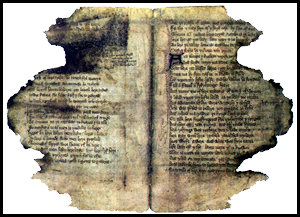The History Of All Saints' Wickhambrook
"Piers the Ploughman"
by William LangIand (c.1360)
Fragment of a manuscript of "Piers the Ploughman" by William LangIand (c.1360) found in wall at The Old Vicarage in the 1960s. The original was in the collection of Martin Schliven, largest private archive based in Norway but is now to be found permanently at The Beneicke Library of Yale University in Newhaven, Connecticut, USA. A copy of the complete fragment now hangs in The Old Vicarage.
After the sharpest showers the sun shines brightest;
No weather is warmer than after the blackest clouds,
Nor any love fresher nor friendship fonder
Than after strife and struggle,
when Love and Peace have conquered.

Piers the Ploughman
(Extracted translation from another part of "Piers the Ploughman") William Langland is one of the most celebrated English poets of medieval times. "Piers the Ploughman" was a story about social behaviour, probity and morality, with allegorical themes interpreting parts of the Scriptures. This fragment shown tells of the marriage of Lady "Mede" (a synonym for "reward" - referring in this context to the perversion of truth through bribery and love of money that was prevalent at the time).
Coincidentally, the resident vicar at The Old Vicarage in Wickhambrook from 1355-1358 - John de Flete - also held the title of Keeper of the King's Jewels, and during that period the clergy were often implicated in tales of "mede" and bribery, a theme which runs through the story of "Piers the Ploughman".
|









